2023年安徽中考英语总复习二轮专题课件:专题二 动词 情态动词(17张PPT)
文档属性
| 名称 | 2023年安徽中考英语总复习二轮专题课件:专题二 动词 情态动词(17张PPT) | 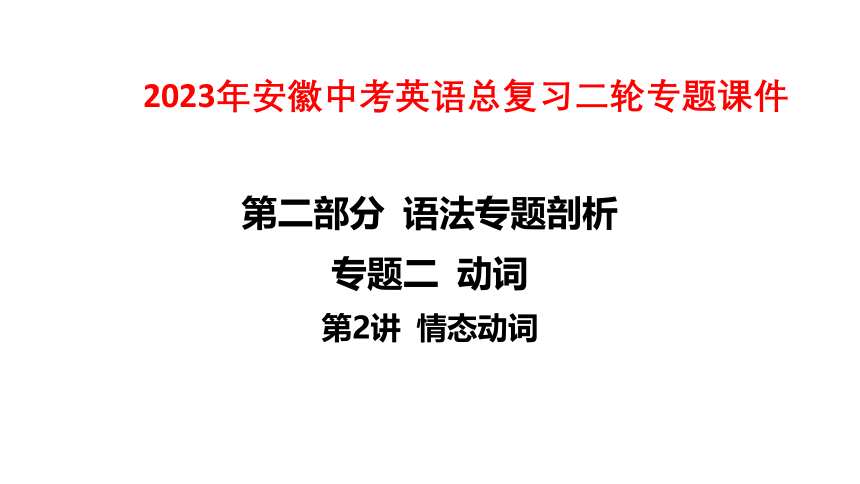 | |
| 格式 | zip | ||
| 文件大小 | 1.2MB | ||
| 资源类型 | 教案 | ||
| 版本资源 | 通用版 | ||
| 科目 | 英语 | ||
| 更新时间 | 2023-04-06 14:39:53 | ||
图片预览

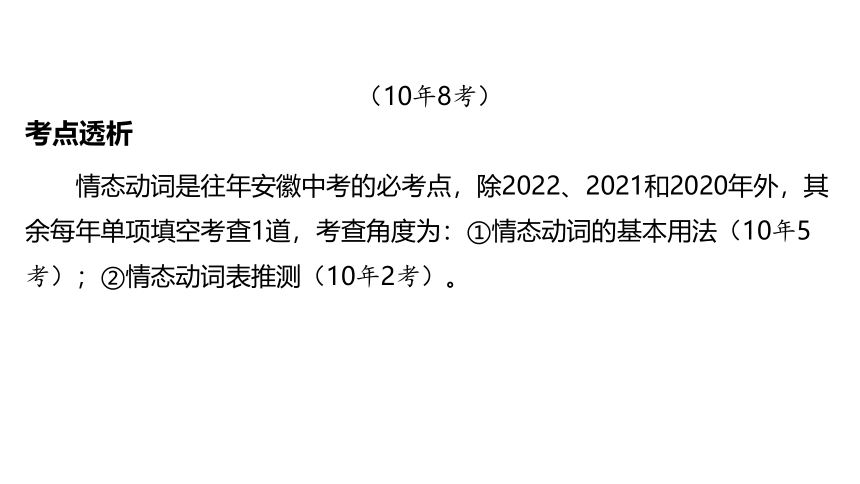
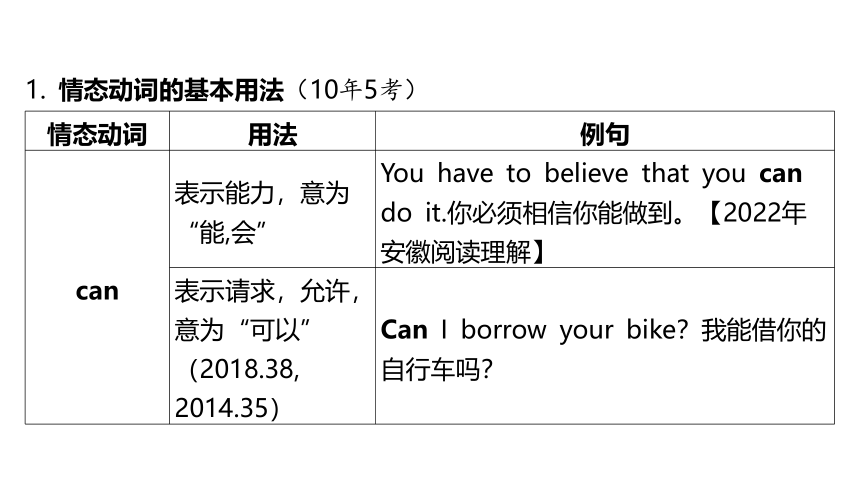
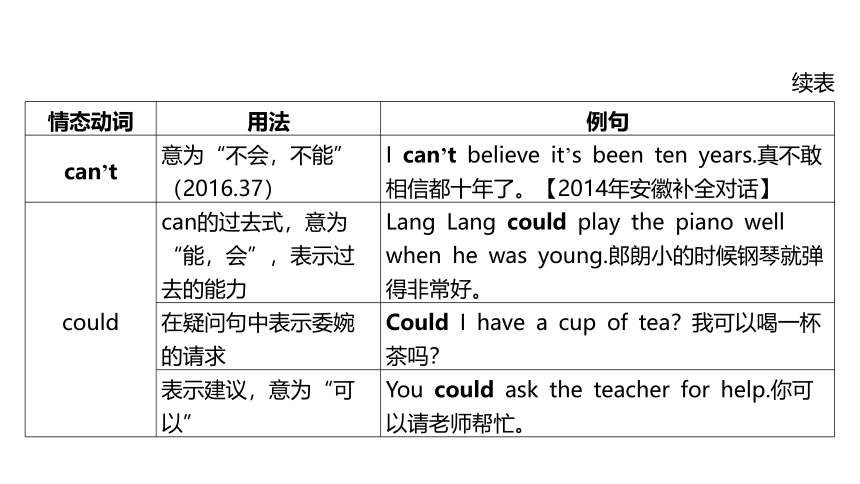
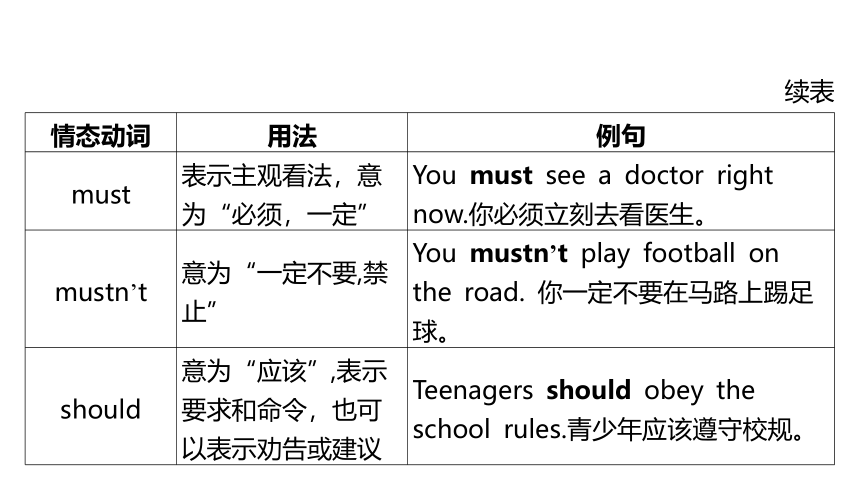

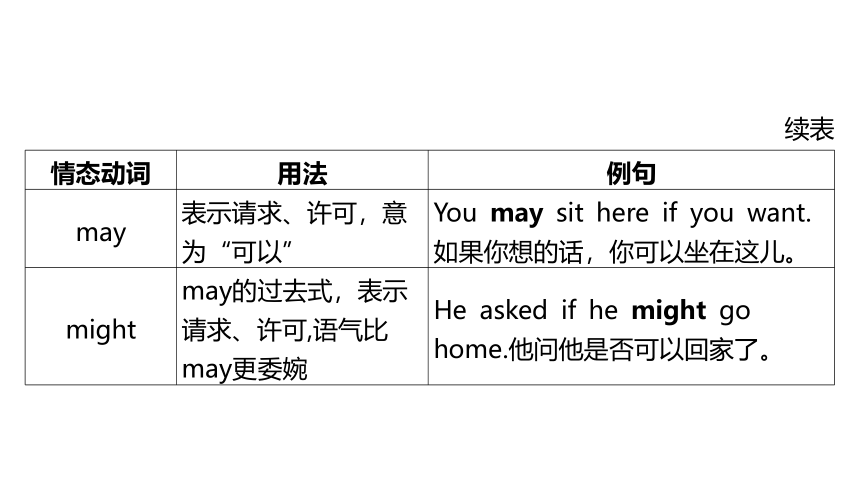
文档简介
(共17张PPT)
第二部分 语法专题剖析
专题二 动词
第2讲 情态动词
2023年安徽中考英语总复习二轮专题课件
(10年8考)
考点透析
情态动词是往年安徽中考的必考点,除2022、2021和2020年外,其余每年单项填空考查1道,考查角度为:①情态动词的基本用法(10年5考);②情态动词表推测(10年2考)。
1. 情态动词的基本用法(10年5考)
情态动词 用法 例句
can 表示能力,意为“能,会” You have to believe that you can do it.你必须相信你能做到。【2022年安徽阅读理解】
表示请求,允许, 意为“可以”(2018.38, 2014.35) Can I borrow your bike?我能借你的自行车吗?
情态动词 用法 例句
can’t 意为“不会,不能”(2016.37) I can’t believe it’s been ten years.真不敢相信都十年了。【2014年安徽补全对话】
could can的过去式,意为“能,会”,表示过去的能力 Lang Lang could play the piano well when he was young.郎朗小的时候钢琴就弹得非常好。
在疑问句中表示委婉的请求 Could I have a cup of tea?我可以喝一杯茶吗?
表示建议,意为“可以” You could ask the teacher for help.你可以请老师帮忙。
续表
情态动词 用法 例句
must 表示主观看法,意为“必须,一定” You must see a doctor right now.你必须立刻去看医生。
mustn’t 意为“一定不要,禁止” You mustn’t play football on the road. 你一定不要在马路上踢足球。
should 意为“应该”,表示要求和命令,也可以表示劝告或建议 Teenagers should obey the school rules.青少年应该遵守校规。
续表
情态动词 用法 例句
shouldn’t 意为“不应该”(2013.22) We shouldn’t waste water.我们不应该浪费水。
ought to 意为“应该”,既可指有责任或有义务做某事,也可指建议或劝告 He ought to have kept his promise.他原本应该遵守他的诺言。
续表
情态动词 用法 例句
may 表示请求、许可,意为“可以” You may sit here if you want.如果你想的话,你可以坐在这儿。
might may的过去式,表示请求、许可,语气比may更委婉 He asked if he might go home.他问他是否可以回家了。
续表
情态动词 用法 例句
need 作情态动词时,主要用于否定句和疑问句中 Need you leave so soon 你有必要这么快就走吗?
needn’t need的否定式,表示“不必”,常用于must提问的否定回答(2019.39) —Must I finish my homework now?我必须现在完成我的作业吗?
—No, you needn’t.不,你不必。
续表
情态动词 用法 例句
had better 意为“最好”,没有人称和数的变化,had better not意为“最好不要” You had better not smoke, because it’s bad for your health.你最好不要吸烟,因为它对你的健康不利。
have to 意为“不得不”,多表示客观必要 I have to get up early tomorrow.我明天不得不早起。
续表
情态动词 用法 例句
shall 常用于疑问句,多用于第一人称,表示请求或征求对方意见 Shall we go to the zoo? 我们去动物园好吗?
will 表示意愿或请求,用于疑问句中,常用于第二、三人称 Will you please pass the book to me? 请你把那本书递给我,好吗?
would 表示建议或个人意愿,表示建议时,语气较委婉 Would you please help me with my maths? 你可以帮我学习数学吗?
续表
【拓展】
(1)由must引导的一般疑问句,肯定回答用must或have to,否定回答用needn’t或don’t have to。
(2)May I…?表示请求时,否定回答用mustn’t或can’t。
(3)由need引导的一般疑问句,肯定回答用must或have to,否定回答用needn’t。
2. 情态动词表推测的用法(10年2考)
情态动词 用法 例句
must 表示非常有把握的肯定推测,“一定,肯定”(100%的可能性) They must be very tired after a long walk.走了这么长的路之后,他们一定很累了。
may 表示把握不大的推测,“有可能,也许”(2017.39, 2015.44) She may come back tomorrow, but I’m not sure.她可能明天回来,但是我不确定。
情态动词 用法 例句
might/could “有可能,也许”(20%~80%的可能性),语气缓和、较委婉 She might have gone to the library. She likes reading books in the afternoon.她或许去图书馆了。她下午喜欢看书。
续表
情态动词 用法 例句
can’t 表示否定推测,语气强烈,意为“一定不,不可能”,可能性几乎为零 Miss Gao can’t be in the classroom. I just saw her in the office.高老师不可能在教室。我刚刚在办公室看见她了。
may not 表示否定推测,语气不确定,意为“可能不” She may not be the greatest writer in the world, but her works influenced me a lot.她可能不是世界上最伟大的作家,但她的作品对我影响很大。
续表
十年真题
1.(2019年39题)The designer has tried every possible way to
make the robot light, so you ____ worry about its weight.
A.must B.may C.can’t D.needn’t
2.(2018年38题)—May I watch TV, Dad
—When your homework is finished, you ____.
A.should B.can C.must D.need
√
√
3.(2017年39题)—Mum, I’ve signed for the box. What’s in it
—I’m not sure. It ____ be a present from your uncle.
A.need B.must C.may D.will
4.(2016年37题)Please don’t make so much noise. I ____ hear
the speaker very well.
A.needn’t B.mustn’t C.can’t D.shouldn’t
5.(2013年32题)You ____ drive your car so fast. It’s very
dangerous.
A.wouldn’t B.shouldn’t C.couldn’t D.mightn’t
√
√
√
提升训练
6.—Could I ride an electric bicycle to school, Mr. Wang
—No, you ____. Students under the age of 16 aren’t allowed
to ride electric bicycles.
A.needn’t B.shouldn’t C.couldn’t D.mustn’t
7.Life is changeable. No one knows what ____ happen in the
future. So we should cherish our life.
A.should B.must C.might D.can
√
√
8.Look! The traffic light has turned red. We ____ stop our car.
A.can B.can’t C.must D.mustn’t
√
第二部分 语法专题剖析
专题二 动词
第2讲 情态动词
2023年安徽中考英语总复习二轮专题课件
(10年8考)
考点透析
情态动词是往年安徽中考的必考点,除2022、2021和2020年外,其余每年单项填空考查1道,考查角度为:①情态动词的基本用法(10年5考);②情态动词表推测(10年2考)。
1. 情态动词的基本用法(10年5考)
情态动词 用法 例句
can 表示能力,意为“能,会” You have to believe that you can do it.你必须相信你能做到。【2022年安徽阅读理解】
表示请求,允许, 意为“可以”(2018.38, 2014.35) Can I borrow your bike?我能借你的自行车吗?
情态动词 用法 例句
can’t 意为“不会,不能”(2016.37) I can’t believe it’s been ten years.真不敢相信都十年了。【2014年安徽补全对话】
could can的过去式,意为“能,会”,表示过去的能力 Lang Lang could play the piano well when he was young.郎朗小的时候钢琴就弹得非常好。
在疑问句中表示委婉的请求 Could I have a cup of tea?我可以喝一杯茶吗?
表示建议,意为“可以” You could ask the teacher for help.你可以请老师帮忙。
续表
情态动词 用法 例句
must 表示主观看法,意为“必须,一定” You must see a doctor right now.你必须立刻去看医生。
mustn’t 意为“一定不要,禁止” You mustn’t play football on the road. 你一定不要在马路上踢足球。
should 意为“应该”,表示要求和命令,也可以表示劝告或建议 Teenagers should obey the school rules.青少年应该遵守校规。
续表
情态动词 用法 例句
shouldn’t 意为“不应该”(2013.22) We shouldn’t waste water.我们不应该浪费水。
ought to 意为“应该”,既可指有责任或有义务做某事,也可指建议或劝告 He ought to have kept his promise.他原本应该遵守他的诺言。
续表
情态动词 用法 例句
may 表示请求、许可,意为“可以” You may sit here if you want.如果你想的话,你可以坐在这儿。
might may的过去式,表示请求、许可,语气比may更委婉 He asked if he might go home.他问他是否可以回家了。
续表
情态动词 用法 例句
need 作情态动词时,主要用于否定句和疑问句中 Need you leave so soon 你有必要这么快就走吗?
needn’t need的否定式,表示“不必”,常用于must提问的否定回答(2019.39) —Must I finish my homework now?我必须现在完成我的作业吗?
—No, you needn’t.不,你不必。
续表
情态动词 用法 例句
had better 意为“最好”,没有人称和数的变化,had better not意为“最好不要” You had better not smoke, because it’s bad for your health.你最好不要吸烟,因为它对你的健康不利。
have to 意为“不得不”,多表示客观必要 I have to get up early tomorrow.我明天不得不早起。
续表
情态动词 用法 例句
shall 常用于疑问句,多用于第一人称,表示请求或征求对方意见 Shall we go to the zoo? 我们去动物园好吗?
will 表示意愿或请求,用于疑问句中,常用于第二、三人称 Will you please pass the book to me? 请你把那本书递给我,好吗?
would 表示建议或个人意愿,表示建议时,语气较委婉 Would you please help me with my maths? 你可以帮我学习数学吗?
续表
【拓展】
(1)由must引导的一般疑问句,肯定回答用must或have to,否定回答用needn’t或don’t have to。
(2)May I…?表示请求时,否定回答用mustn’t或can’t。
(3)由need引导的一般疑问句,肯定回答用must或have to,否定回答用needn’t。
2. 情态动词表推测的用法(10年2考)
情态动词 用法 例句
must 表示非常有把握的肯定推测,“一定,肯定”(100%的可能性) They must be very tired after a long walk.走了这么长的路之后,他们一定很累了。
may 表示把握不大的推测,“有可能,也许”(2017.39, 2015.44) She may come back tomorrow, but I’m not sure.她可能明天回来,但是我不确定。
情态动词 用法 例句
might/could “有可能,也许”(20%~80%的可能性),语气缓和、较委婉 She might have gone to the library. She likes reading books in the afternoon.她或许去图书馆了。她下午喜欢看书。
续表
情态动词 用法 例句
can’t 表示否定推测,语气强烈,意为“一定不,不可能”,可能性几乎为零 Miss Gao can’t be in the classroom. I just saw her in the office.高老师不可能在教室。我刚刚在办公室看见她了。
may not 表示否定推测,语气不确定,意为“可能不” She may not be the greatest writer in the world, but her works influenced me a lot.她可能不是世界上最伟大的作家,但她的作品对我影响很大。
续表
十年真题
1.(2019年39题)The designer has tried every possible way to
make the robot light, so you ____ worry about its weight.
A.must B.may C.can’t D.needn’t
2.(2018年38题)—May I watch TV, Dad
—When your homework is finished, you ____.
A.should B.can C.must D.need
√
√
3.(2017年39题)—Mum, I’ve signed for the box. What’s in it
—I’m not sure. It ____ be a present from your uncle.
A.need B.must C.may D.will
4.(2016年37题)Please don’t make so much noise. I ____ hear
the speaker very well.
A.needn’t B.mustn’t C.can’t D.shouldn’t
5.(2013年32题)You ____ drive your car so fast. It’s very
dangerous.
A.wouldn’t B.shouldn’t C.couldn’t D.mightn’t
√
√
√
提升训练
6.—Could I ride an electric bicycle to school, Mr. Wang
—No, you ____. Students under the age of 16 aren’t allowed
to ride electric bicycles.
A.needn’t B.shouldn’t C.couldn’t D.mustn’t
7.Life is changeable. No one knows what ____ happen in the
future. So we should cherish our life.
A.should B.must C.might D.can
√
√
8.Look! The traffic light has turned red. We ____ stop our car.
A.can B.can’t C.must D.mustn’t
√
同课章节目录
- 词法
- 名词
- 动词和动词短语
- 动词语态
- 动词时态
- 助动词和情态动词
- 非谓语动词
- 冠词
- 代词
- 数词和量词
- 形容词副词及其比较等级
- 介词和介词短语
- 连词和感叹词
- 构词法
- 相似、相近词比较
- 句法
- 陈述句
- 一般疑问句和否定疑问句
- 特殊疑问句及选择疑问句
- 反意疑问句
- 存在句(There be句型)
- 宾语从句
- 定语从句
- 状语从句
- 主谓一致问题
- 简单句
- 并列句
- 复合句
- 主谓一致
- 主、表语从句
- 名词性从句
- 直接引语和间接引语
- 虚拟语气
- 感叹句
- 强调句
- 倒装句
- 祈使句
- 句子的成分
- 句子的分类
- 题型专区
- 单项选择部分
- 易错题
- 完形填空
- 阅读理解
- 词汇练习
- 听说训练
- 句型转换
- 补全对话
- 短文改错
- 翻译
- 书面表达
- 任务型阅读
- 语法填空
- 其他资料
